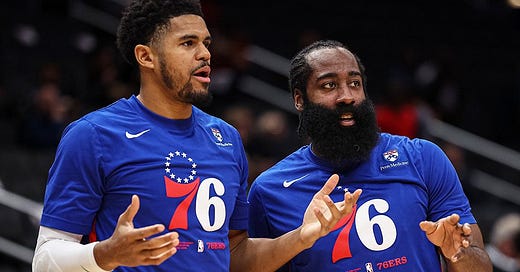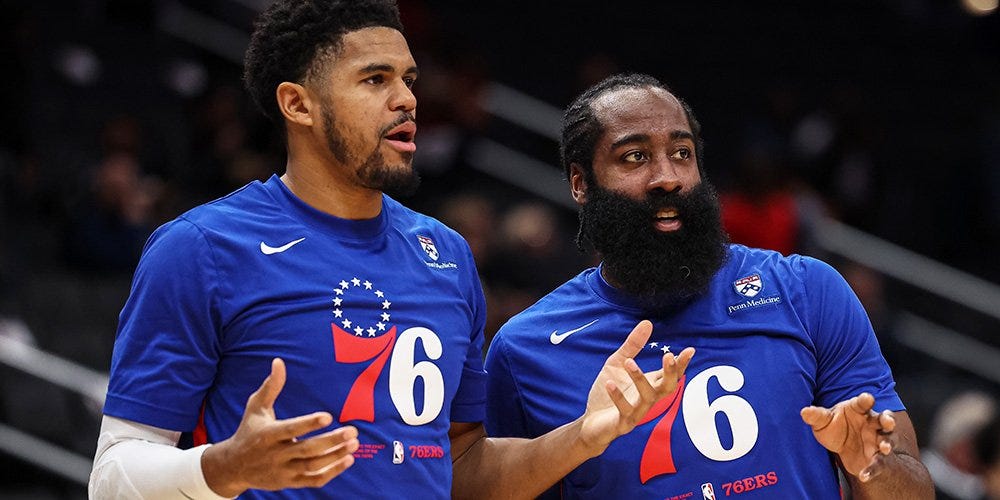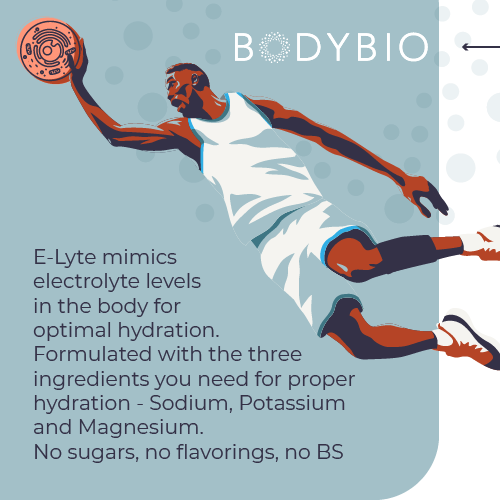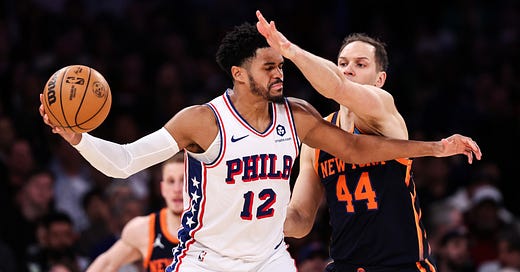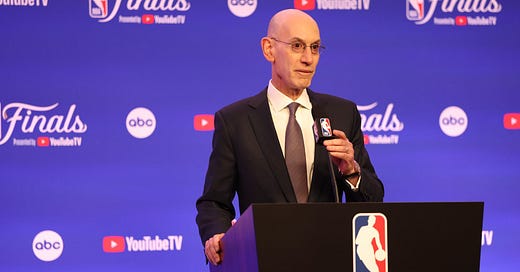
Is Trading Tobias Harris The Right Move For The Sixers?
Could it possibly be worth trading Harris if it inevitably means a downgrade in terms of talent?
Mike O’Connor is the best O’Connor in basketball writing. Previously of The Athletic, you can find Mike on Twitter @MOConnor_NBA. Mike’s writing is brought to you by Body Bio, supplements based on science, focusing on your gut and brain health. Get 20% off E-Lyte, Gut+, and all Body Bio products with promo code RTRS20 at Body Bio’s website.
On Friday morning, we got what has become a quarterly update from Shams Charania of The Athletic:
“Philadelphia’s Tobias Harris has come up in the 76ers’ conversations with clubs so far, league sources said.”
Indeed, it feels like the Sixers have been shopping Harris since the moment he signed his contract, and every once in a while, newsbreakers feel the need to remind us of that. And while these reports never seem to indicate that there is any serious traction, they do always seem to serve as a reminder that he is readily available should any team come calling with a reasonable offer.
As every Sixers fan is well aware of, trading Harris could never result in a massive haul; in fact, the size of his contract would likely mean that any player coming back in a trade would have to be worse than Harris – or, a player on a similarly terrible contract.
That dynamic begs the question: could it possibly be worth trading Harris if it inevitably means a downgrade in terms of talent? I’m going to take what might be a bold stance here and say that the answer is an obvious yes, given the dynamics of this roster.
I will get into some specific trades that I think are realistic in a bit, but the gist of my argument for trading Tobias for scraps is this: he is incredibly, unbelievably superfluous on this team. This roster needs none of the things that he brings, and all of the things that he doesn’t bring. If you could trade Harris for a starter-level 3-and-D wing, it would bring only a minimal blow to their offense, and a meaningful boost to their defense.
At the time of this writing, the Sixers rank 3rd in the league in defensive rating, but I would argue that their defensive success thus far has a good bit of fool’s gold in it. Opponents are currently shooting 32.2 percent on 3s against the Sixers, including 26 percent from the corners – both ranking lowest in the league. If those numbers start to normalize (which they should, given that there is nothing in the Sixers’ schemes or personnel that would lead us to believe that they would be exceptional at defending the 3-point line), that defensive rating will come crashing back down towards average. NBA.com’s tracking data has the Sixers’ defense at 24th in the league in 3-point shots contested, which adds further likelihood to the possibility that the opponent’s shooting woes are heavily based on luck.
The Sixers are currently allowing opponents to shoot 70.1 percent at the rim, good for 27th in the league. They are 19th in deflections, 29th in loose balls recovered, and 17th in defensive rebounding percentage. Translation: a team that tried hard to get tougher and peskier during the offseason has remained relatively impotent.
Those stats tend to match the eye test. Rarely do I feel like the Sixers are making life incredibly difficult for the opponent to run their sets on offense, or are flying around the court on a string, making complex rotations at lightning speed – certainly not to the extent of a team that has the 3rd best defense in the league. Friday night’s second half against the Bucks – without Maxey, Harden, and Harris – was likely the best defensive half of the season by my subjective eye test.
P.J. Tucker has had an up and down (mostly down) start to the season on the defensive end, and while I expect him to improve a bit as the year goes on, one thing that has become abundantly clear is that he will not be enough to single handedly turn the Sixers into a rough-and-tumble defense. His hustle plays are a step in the right direction, but he’s not exactly prime Dennis Rodman, mucking things up at an incalculable rate on a nightly basis.
I just don’t believe that a team can win the championship with three players in the starting lineup (Maxey, Harden, Harris) who not only have serious defensive issues, but also make almost no impact in the hustle stats categories. Simply put, the team would be much better off with a gritty, rangy, 3-and-D player in Harris’ place who can help to further offset the weaknesses of Maxey and Harden, rather than provide an unnecessary added dose of their strengths.
As for what a Harris trade would look like, the options aren’t all that pretty, but here’s a bit of a wild one that I think could work if the Bulls decide to really blow things up:
Sixers get: Alex Caruso, Lonzo Ball
Lakers get: Tobias Harris, Matisse Thybulle, Nikola Vucevic
Bulls get: Russell Westbrook, Kendrick Nunn, Lakers 2027 first round pick, Lakers’ 2029 first round pick, rights to swap with Sixers’ 2024 first round pick, Sixers’ 2029 first round pick
The key thing to keep in mind with this trade is that Lonzo Ball may or may not play this season, and his health should be considered a major red flag after that, as well. He injured his knee in January and still isn’t running. From the Bulls’ perspective, this is mostly an opportunity to clear salary and start the rebuild process while obtaining a few nice draft picks in the process. From the Sixers’ perspective, Caruso fills the Sixers’ needs much better than Harris – he is the type of player who single handedly transforms your defense – and Ball is an interesting flier moving forward. If he returns next season and is roughly the player he was before the injury, this is a major win for the Sixers.
Speaking of buying low on often injured players, here’s another possible deal.
Sixers get: Jonathan Isaac, Gary Harris, Terrence Ross
Magic get: Tobias Harris, Matisse Thybulle, 2027 second round pick
The upside of this trade relative to the previous one is that the Sixers don’t sacrifice nearly the same quality of draft assets. Isaac, when healthy, is an unbelievably dynamic defensive player who can lock up on the ball and fly around the court cleaning up mistakes off the ball. In terms of raw ability, he is an incredible fit on this roster, and if he’s the player he was in 2019-20, he would start on this team hands down. But obviously, questions about Isaac’s health and general makeup should come into play – this is not a political critique, but the fact that he has made more headlines for politics than basketball in the past two years should raise obvious questions about his dedication to his craft. I am quite certain that everyone will hate the idea of trading for Isaac, but game-changing defensive wings are hard to come by. Isaac is likely the only player in the league who A) has a chance to transform your team’s defensive identity, and B) could be obtainable for Tobias Harris.
Gary Harris and Terrence Ross have also faced a variety of health issues in recent years, but are two quality bench players who would certainly factor into the Sixers’ rotation if healthy.
From the Magic’s perspective, they clear some long term salary and rid themselves of the Isaac drama in exchange for a stable veteran presence to help oversee their rebuild, as well as an interesting young wing in Thybulle. The most likely outcome of this trade is a relative wash for both teams, but from the Sixers’ perspective, they at least take a swing on a couple of players who fit their needs more so than Harris.
Outside of those types of deals, you also could consider trying to ship Harris out in exchange for a superior offensive fit, and simply go all-in on that side of the ball. That might mean trading Harris and a pick for Eric Gordon. One could make the case that Harris and Thybulle for Gordon Hayward and Kelly Oubre makes them a better offensive team. If they could figure out how to match salaries, Bojan Bogdanovic is another interesting name to consider. Each of those three players – Gordon, Bogdanovic, and Hayward – bring a dynamic of off-ball movement that Harris does not. Adding any one of those three would help alleviate some of the offensive stagnation that we’ve seen early in the season and would add a certain degree of spontaneity.
To me, the bottom line is that I struggle to see a way in which Harris elevates this team – and that is not to say that he has underperformed this season whatsoever. The team just needs things that he does not bring; on nights when the Sixers play well, he often feels irrelevant to their success. To date, their biggest issues have been the slow-paced, stagnant offense, and the lack of cohesiveness, force, and speed to their defense. Harris is simply not making any of those dynamics better, and if the Sixers are able to find a trade that fills one or more of those needs, they should absolutely do it.


